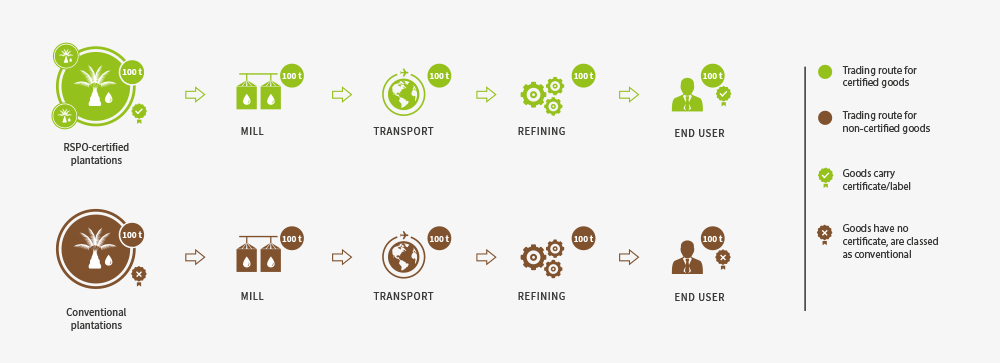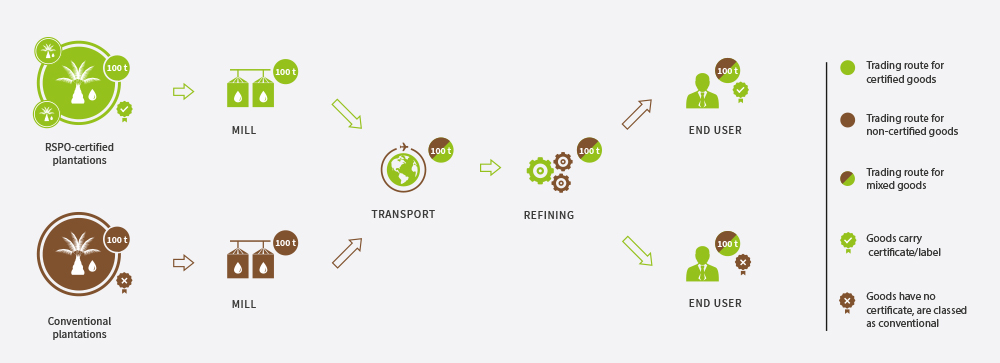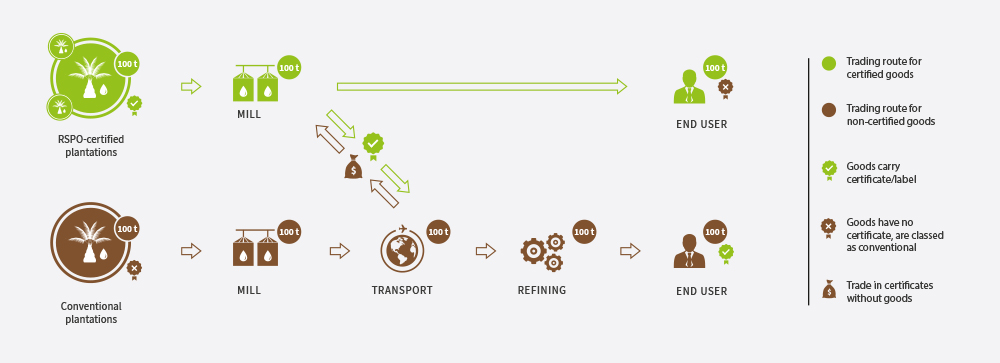Trade options
There is different trade options in the procurement of sustainably produced palm oil. What all of the definitions have in common is that palm oil and palm kernel oil comes from certified and audited plantations. In the following section, you can find out more about the differences of the different trade options.
IP Identity Preserved
The most rigorous trading model requires full separation throughout the supply chain. Processers and traders must keep certified palm oil physically separate from conventional oil at every stage from the plantation to the end product. They must demonstrate that there has been no contact between the two types. Since Identity Preserved palm oil must be segregated from other certified palm oil and from conventional palm oil throughout the supply chain, the plantation from which the oil comes can always be identified. Production of Identity Preserved palm oil requires complex and expensive infrastructure. At the same time it provides the maximum assurance for end users, because the provenance of the oil can be traced all the way back to the plantation.
SG Segregation
Like the Identity Preserved system, segregation requires physical separation of certified and non-sustainable oil throughout the supply chain. In contrast to IP, however, the products of different certified plantations can be mixed. The product flow is monitored by independent certifiers. This assures manufacturers of end products that the sustainability of the palm oil that they buy has been verified and monitored throughout the supply chain. Segregated palm oil is often used when pure palm oil is needed, because sufficient quantities of oil under this option are available on the market.

MB Mass Balance
In the Mass Balance approach, sustainable palm oil from certified plantations is mixed with conventional, non-certified palm oil in the value chain. The proportion of the certified product is recorded and the system ensures that the quantity of the end product that is certified is consistent with the quantity of oil from certified sources that was supplied at the start. The recording and transfer of certified palm oil is an accounting process. The Mass Balance option enables sustainable goods to be labelled as such throughout the product chain while avoiding the need to set up additional infrastructure for a parallel supply chain. Because certified and conventional goods are not physically separated, MB goods can be very easily traded within the supply chain. This option is particularly useful in connection with palm kernel oil and derivatives.

B&C Book and Claim
Book and Claim simply involves a trade in certificates. The physical goods (i.e. the palm oil) and the sustainability certificates are traded separately from each other. The certificates represent a specified quantity of sustainable palm oil that has been produced but has not been physically traded as certified goods. As with green electricity, producers are issued with a tradable certificate that can be purchased at auction by the manufacturers of end products. The Book and Claim scheme for RSPO-certified palm oil is currently operated by GreenPalm.
It offers a good entry point to the use of certified palm oil.
A special type of certificate is represented by the Independent Smallholder (I.S.) certificates that are traded in the RSPO. These Book and Claim certificates are available only to independent smallholders. In the past it has been very difficult to include independent smallholders in the global flow of certified goods. The sale of I.S. certificates is therefore the only option for independent smallholders who want to produce and sell sustainable palm oil. FONAP regards I.S. certificates as equivalent to all the other trading options.

VIDEO ON TRADING MODELS
GIZ and ISEAL have produced the following video which summarises the trading models:

Sekretariat Forum Nachhaltiges Palmöl
c/o GIZ GmbH
Friedrich-Ebert-Allee 32+36
D-53113 Bonn
+49 228 4460-1346
E-Mail schreiben
LinkedIn
Youtube
Twitter